For many tourists visiting Japan, the discount chain Don Quijote, popularly known as Donki, is a must-visit, whether for the adventure of passing through its mazelike interior, or simply as the best single place to find the souvenirs and other products they want to buy.
Repeat Customers
Needless to say, when people in Japan talk about Don Quijote, they are not referring to the classic novel by Cervantes, but the chain of discount stores, instantly recognizable by their garish yellow-and-black facades. Step into one and you will find towering stacks of merchandise crammed into every corner, with maze-like aisles winding through it all. From daily necessities and cosmetics to luxury goods, medicine, alcohol, and even adult products, the chain popularly known as Donki sells just about everything. It might sound like an exaggeration, but it would not be far off to say, “If you can’t find it there, it doesn’t exist.”

The entrance to Don Quijote Kabukichō with shelves packed tightly with merchandise. Photo taken in Shinjuku, Tokyo, on June 17, 2025. (© Nippon.com)
“I came to Donki yesterday too, and I think I’ll be back shopping here again.” That is the common refrain from many visitors to Japan interviewed for this article. Often they stop locals on the street to ask, “Where’s the nearest Donki?” The numbers back up the chain’s popularity among international visitors. In the first half of the fiscal year ending June 2025, duty-free sales at Don Quijote’s parent company, Pan Pacific International Holdings, reached an all-time high of ¥79.8 billion, which was a ¥29.7 billion increase from the same period the previous fiscal year.
A Store with Everything
So why is Donki such a hit with visitors to Japan? Currently, Don Quijote operates nearly 500 stores across the country. While one can find them in major cities, they are also spread throughout regional cities and suburbs. Among these, the locations most frequented by inbound tourists are in Tokyo, and especially in Shibuya, Shinjuku, and Ginza.
I visited one such hotspot: Don Quijote Kabukichō, located at the entrance to Shinjuku’s famous entertainment district. The store is packed with souvenir goods tailored to the needs of foreign visitors. One standout favorite is matcha tea. A group of three women from Thailand picked up some matcha products and told me, “This time, we came to buy matcha powder and sweets. And also cosmetics. What’s great about Donki is that it carries so many different brands all in one place. It’s tax-free and cheap, but you can especially trust the quality for Japanese-made cosmetics.”
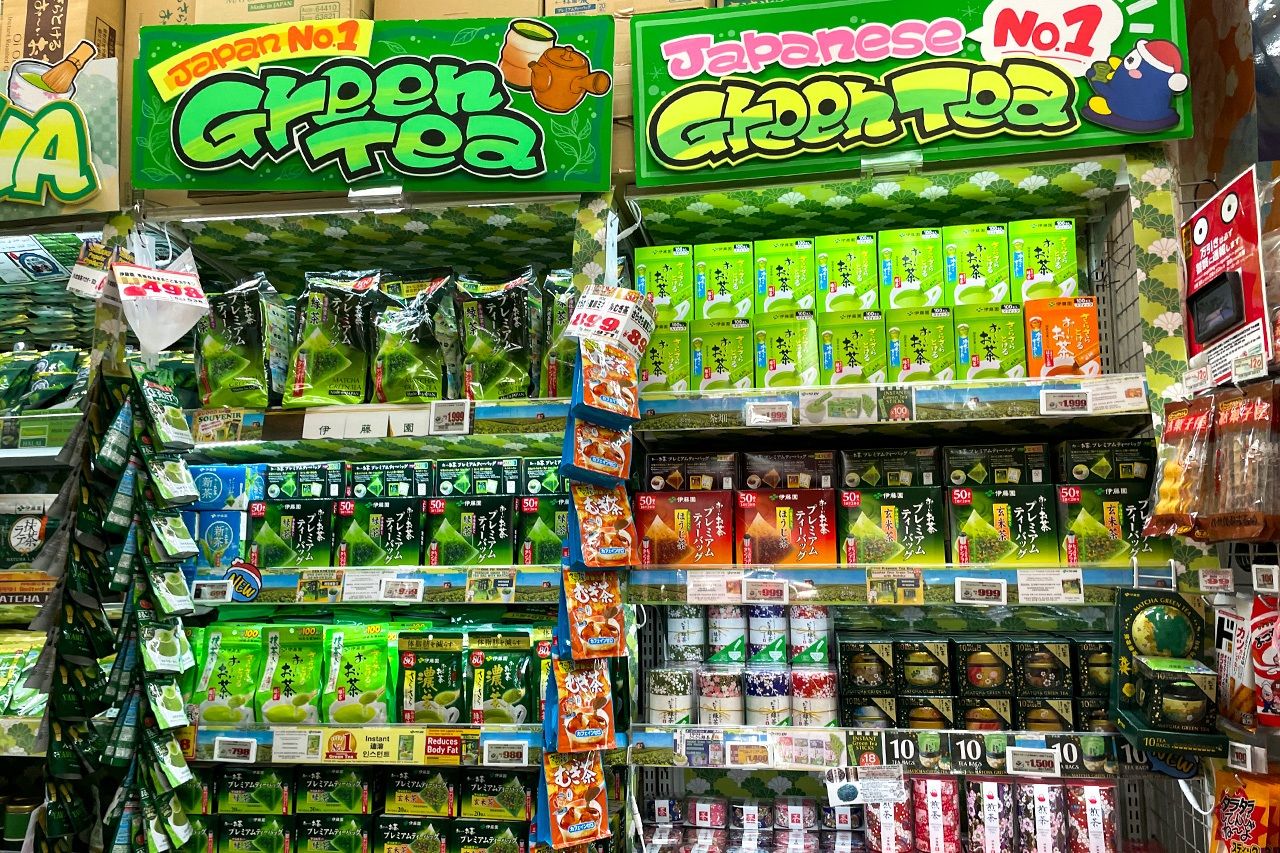
Japanese matcha and other green tea products come in a wide variety. Photo taken in Don Quijote Kabukichō on June 19, 2025. (© Tanigashira Kazuki)
In the anime section, a 23-year-old man from Amsterdam said: “I’ve always liked Tokyo, and I learned about Donki as a place to buy anime merch. Most of what I buy is anime related.” Shelves are packed with products from popular franchises like Pokémon, Hello Kitty, Naruto, and One Piece, with a selection so extensive it could rival that of specialty anime stores. The sheer mix and volume of merchandise is impressive. At Donki, “you can get everything.” That convenience is a major draw for visitors to Japan.
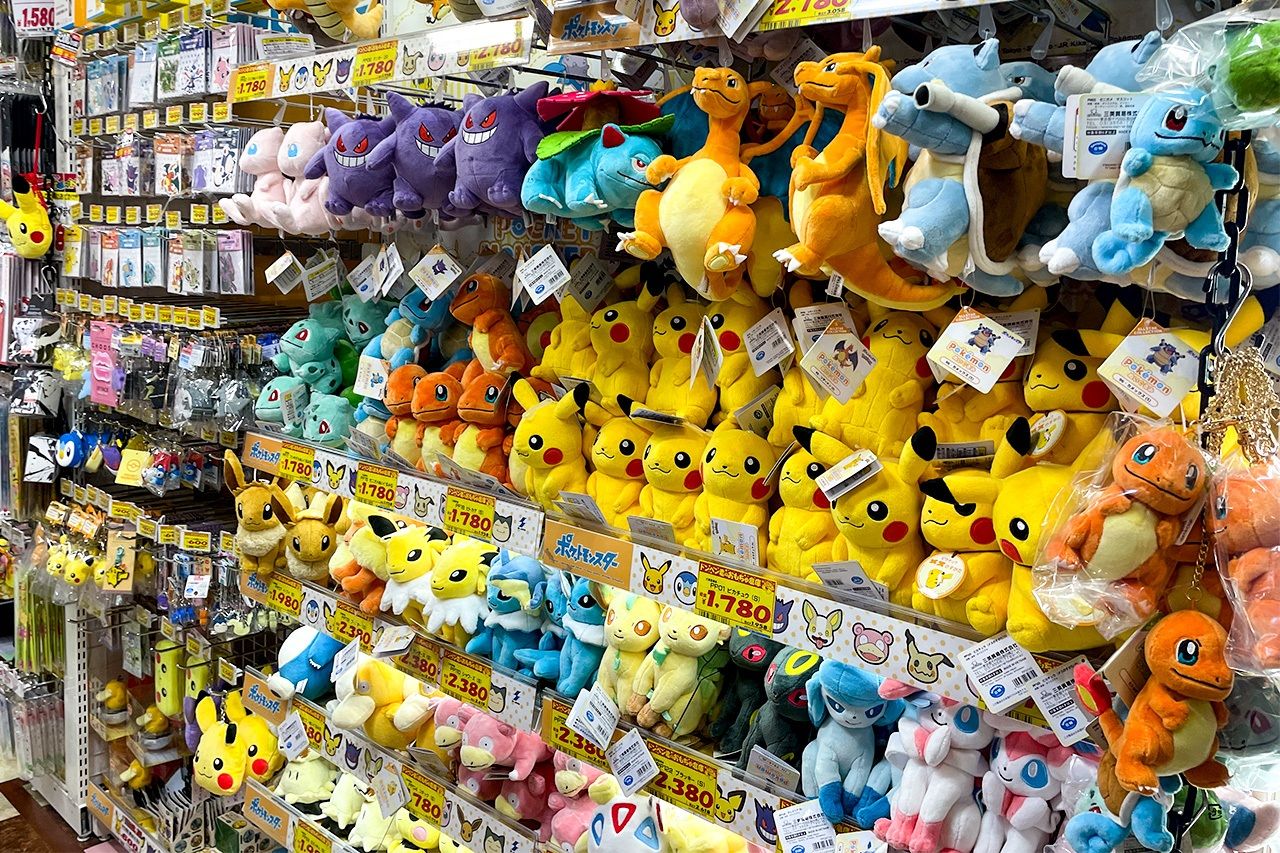
A section featuring character plushies from Pokémon. Photo taken in Don Quijote Kabukichō on June 19, 2025. (© Tanigashira Kazuki)
Becoming a Dream Store
Donki’s greatest strength lies in its deep understanding of customer needs. According to company materials, the most frequently purchased item among international visitors at the Kabukichō store is Bake Creamy Cheese, a snack you can find in virtually any store, and not something uniquely Japanese like matcha or sakura-themed treats. To locals, it is an unremarkable confection, but it ranks as the top seller.

The snack section, with goods stacked nearly to the ceiling. The aisles are narrow, like a maze. Photo taken in Don Quijote Kabukichō on June 19, 2025. (© Tanigashira Kazuki)
The reason is that it is creamy cheese, but does not melt easily, even in hot climates. The product is a hit in countries like Thailand, Taiwan, and South Korea. Yet from within Japan, this kind of preference is not immediately obvious. So how does Donki manage to identify such specific customer needs?
The secret lies in its unique store management system of delegated authority. Under this approach, decisions about how to sell products and what to stock are left to the frontline staff at each store and even each sales floor. In a typical retail chain, such decisions are made centrally at headquarters, resulting in standardized stores across the country. But Donki takes the exact opposite approach. Staff on the ground monitor trends and observe their customers, then decide what to stock and how to display it with remarkable flexibility.
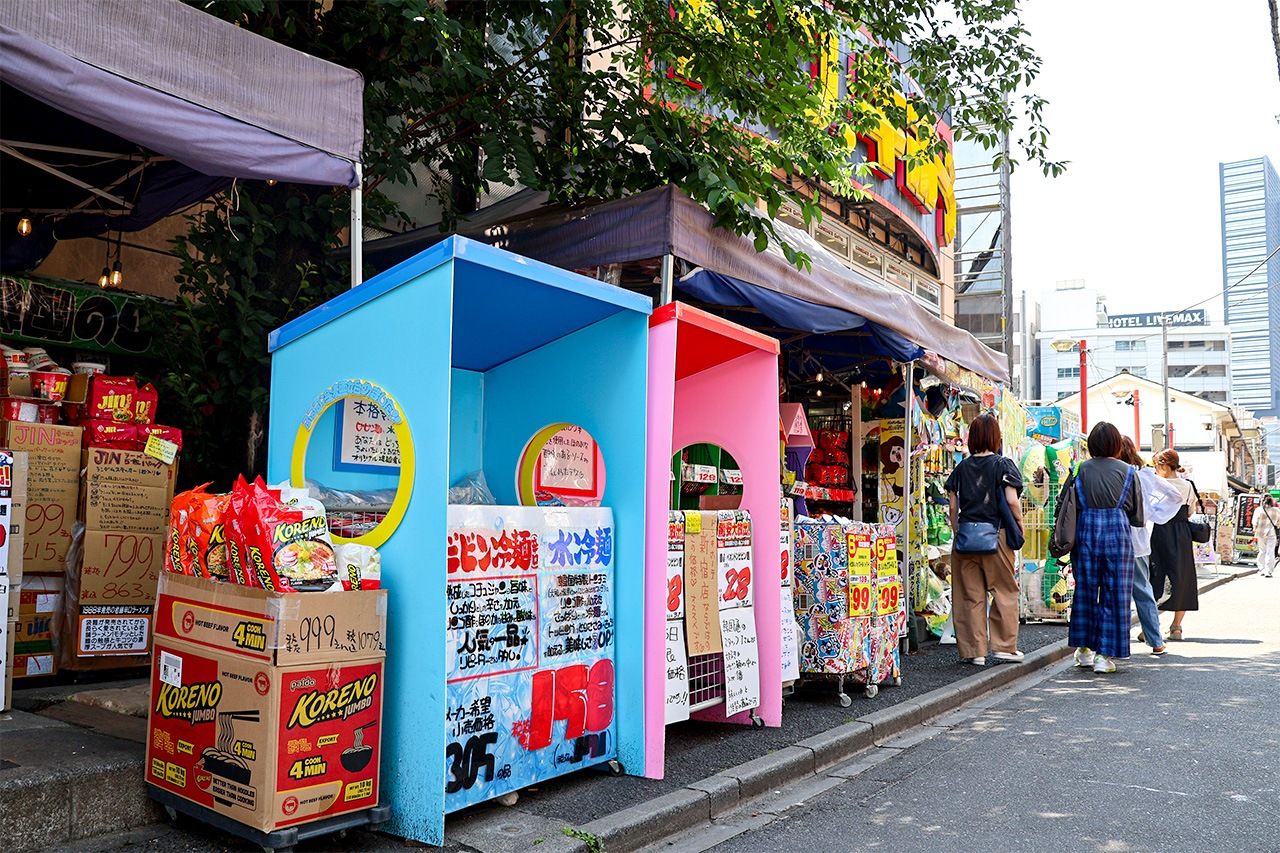
Don Quijote Shinjuku, located in Koreatown, features a wide selection of Korean ingredients. Photo taken in Shinjuku, Tokyo, on June 17, 2025. (© Nippon.com)
This is perhaps most clearly seen in the eye-catching handwritten labels attached to the products. Each one is crafted by staff members who imagine the type of customer who will buy the item, resulting in flamboyant signage filled with bold fonts and an infectious enthusiasm that screams, “You have to buy this!”
In other words, the more customers visit, the more the stores evolve to satisfy them. This positive feedback loop is what keeps drawing international tourists back again and again.
Going Viral
Donki’s efforts to reflect the opinions of international visitors are constantly evolving. One upcoming initiative is a new app for inbound travelers called Majica Global. With it, users will be able to send reviews and candid feedback about their store visits and purchases directly to the company. This will allow it to gather direct input from more customers than ever before.
This kind of digital strategy is already playing out successfully on social media. The group of women from Thailand mentioned earlier said, “We learned about Donki through Facebook and TikTok. In Thailand, many influencers post product reviews, and we found out that the Japanese items they featured were available at Donki.” A man from Rome said, “In Italy, almost no one knows about Don Quijote, but I discovered it on Instagram just a few days before my trip to Japan.”
Many foreign visitors who have been to Donki post their impressions on social media. In fact, searching for “Japan” often turns up Donki-related content. The store’s outrageous exteriors, unexpected interiors, and over-the-top signage make it highly shareable—a perfect formula for the visual nature of platforms like Instagram and TikTok.
In a bid to attract even more inbound tourists, Donki has declared its ambition to become the number one must-visit spot in Japan. Its strategy is built around three phases: raising awareness about Donki before tourists even depart, ensuring customers are satisfied when they visit during their trip, and encouraging them to share their experiences with friends and followers afterward.
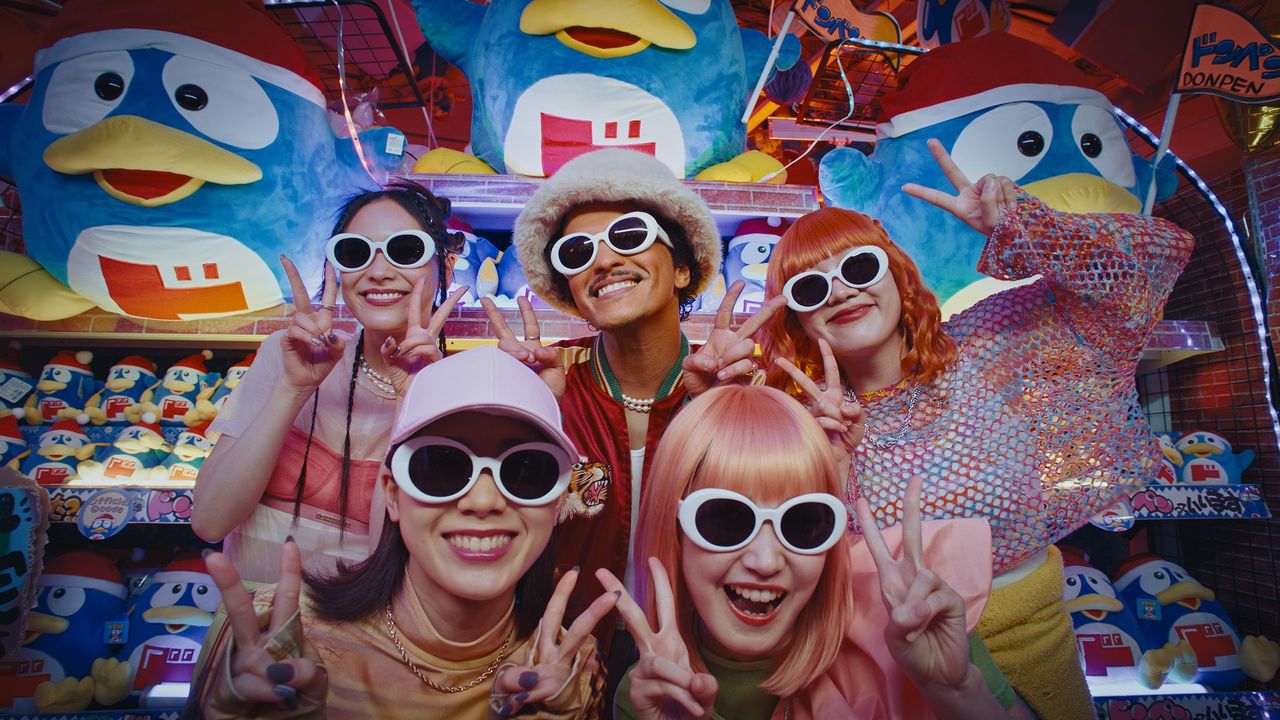
A scene from Don Quijote’s TV commercial, featuring Bruno Mars and dancers. (From a Don Quijote press release)
Of these, the company places particular emphasis on the pre-trip phase by promoting awareness. To that end, it has ramped up its social media promotions. In 2024, Donki produced a promotional video in collaboration with global music icon Bruno Mars, which sparked huge buzz both in Japan and overseas. Known for his love of Japanese culture, Mars’s participation was reportedly prompted by his genuine fondness for Donki itself. Perhaps other global stars will appear in future commercials (Lady Gaga is a notable visitor to the stores).
The Allure of Controlled Chaos
Above all, what captivates international visitors is Donki’s sheer originality. “There’s nowhere like Donki outside of Japan. I don’t know of any other store that sells everything from souvenirs to daily necessities. It’s really unique,” said an American man visiting the Kabukichō store.
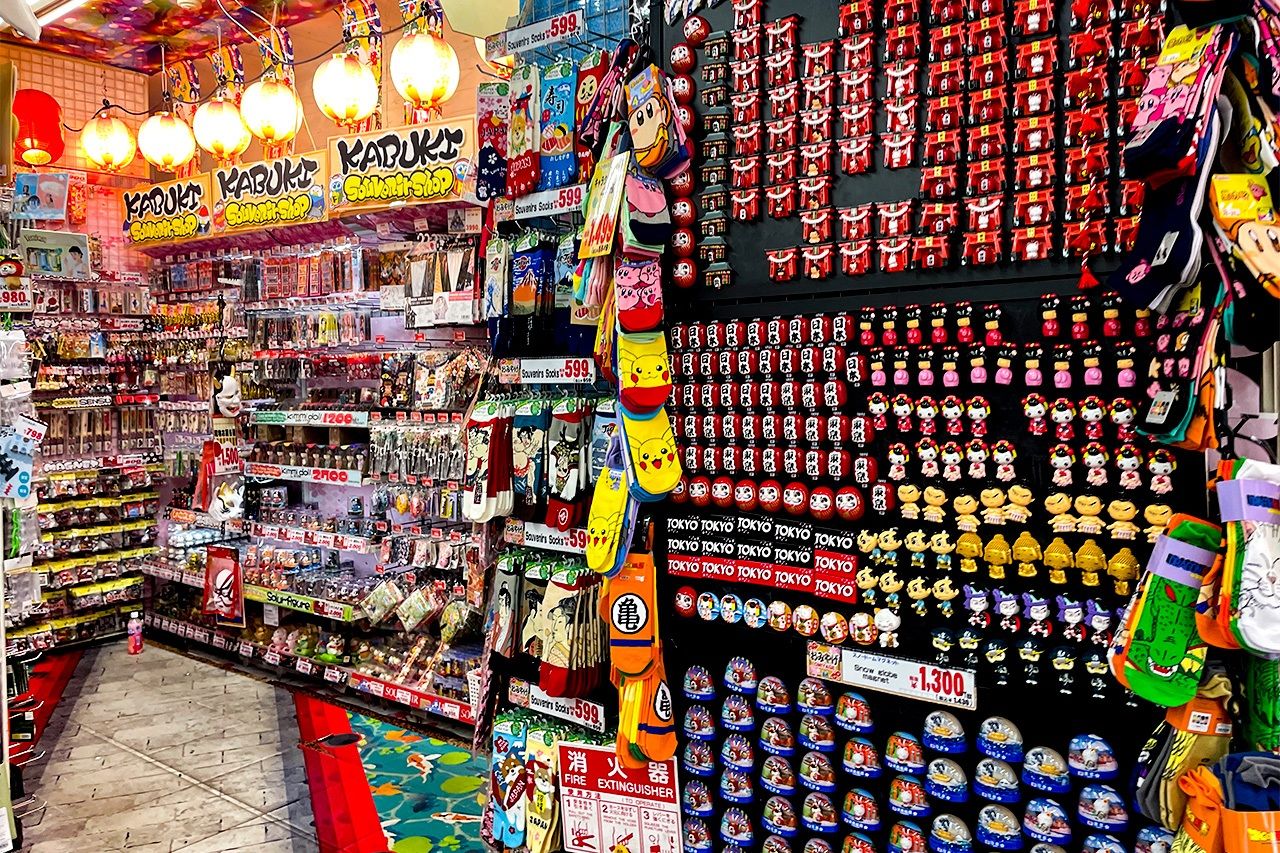
A section filled with distinctly Japanese souvenirs, including kabuki and anime-themed items. Photo taken in Don Quijote Kabukichō on June 19, 2025. (© Tanigashira Kazuki)
The store’s interior is laid out like a labyrinth, making it feel like visitors have wandered into a cave on a treasure hunt. Shoppers often stumble across unexpected items and give in to impulse buys. It is a shopping experience that feels adventurous and exciting.
This chaotic charm might be closely related to a very Japanese architectural concept: the zakkyo building. In his Japanese-only book Weeb Economy, American economist Noah Smith cites these buildings as one of Japan’s defining features. A zakkyo building is a compact structure jam-packed with a variety of businesses. A controlled mess, if you will. The same could be said of Japan’s urban landscapes: uneven skylines, tangled power lines, overlapping signage, streets that look like something out of Blade Runner, with layers of time built up on every corner. Donki encapsulates that visual chaos within its walls.
In my personal view, this cluttered collage is exactly what attracts so many international visitors. In fact, Donki may be the most quintessentially Japanese place in the entire country. If that is true, it is no wonder tourists are so enamored.
So if anyone visiting Japan is unsure of where to go, I would wholeheartedly recommend Donki. Whatever you are looking for, you will find it there. You will also experience a space that might just be one of the most authentically Japanese spots around. In fact, you could almost say, “You can see Japan just by going to Donki.”
(Originally published in Japanese on June 23, 2025. Banner photo: A Don Quijote store in Kabukichō, Tokyo, open 24 hours, draws many inbound tourists. © Nippon.com.)


AloJapan.com